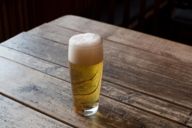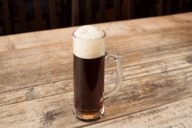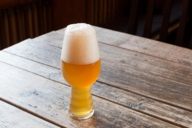
Starkbier, Festbier, Weissbier, Hell, Dunkel, Pils: a typology of Munich's beers – and the people who drink them.
What you need to know: The classic Munich beer: clear, golden, bottom-fermented, with a dense head. Although it is omnipresent these days and is said to be the most traditional Munich beer, it is relatively young. It was only introduced here at the end of the 19th century and soon won the hearts of the beer-loving citizens of Munich.
How it tastes: Unobtrusive. The neutral point on the beer coordination system – which is not intended as a criticism, but rather an accolade. Helles is not too strongly hopped and not too sweet. There is a word for it: “süffig”, meaning “easy to drink”. That simply means that you can drink a lot of it without getting sick of it. Two other types of beer, Zwickelbier and Kellerbier, which taste a little more rugged, have been enjoying great popularity in recent years.
Where to drink it: Anywhere that is “gemütlich” (cosy): in a beer garden, a beer hall, in the Bavarian corner pub – the “Boazn”, by the Isar, in the Wirtshaus, in front of the TV.
Who drinks it: Münchner Helles is liquid democracy. Everyone drinks it! If you are in a Wirtshaus and order “a beer”, you will always be served a Helles.
Examples: Augustiner Helles, Paulaner Münchner Hell, Hacker-Pschorr Münchner Hell, Hofbräuhaus Hell, Löwenbräu Original, Spaten Münchner Hell, Giesinger Münchner Hell

What you need to know: These days, a Dunkeles is only the beer of choice for certain sets, though it was the dominant beer type in Bavaria for centuries. Admittedly, it was not always exactly the same as the Dunkeles of today, since in the past, the colour and taste of beers varied greatly; many of them were cloudy and most were dark.
How it tastes: Dunkeles is the chocolate of beers. It has a heavy, sweet taste, a thick mouthfeel and a creamy froth. It is not usually strongly hopped, but is more strongly malted instead.
Where to drink it: Mostly in the Wirtshaus (tavern) – and even there, mainly with a hearty meal and preferably in winter. It goes well with game, duck and roast pork.
Who drinks it: Locals, often of relatively advanced years and always with a special knowledge of Bavarian cuisine. Usually, you will only drink one Dunkeles and then switch to Helles.
Examples: Spaten Dunkel, Augustiner Dunkel, Löwenbräu Dunkel, Hofbräu Dunkel, Paulaner Ur-Dunkel, Hacker-Pschorr Münchner Dunkel
What you need to know: In addition to Hellem and Export, Festbier is its own, more strongly brewed type of beer. It contains more original wort than normal Helles, and has an alcohol content higher than standard Helles, at 6 percent. Increasingly, darker types of malt are also being used for solid beer, giving it a caramelized luster.
How it tastes: The first sip is always wonderful. After that, though, Festbier can be difficult, because of the glass you use usually for it: a jug with one liter capacity. It goes flat if left to stand for a while. The drink loses its carbonation and you are left with stale, warm, sweet liquid. So – drink up quickly!
Where to drink it: At Oktoberfest. However, special Festbiers are also produced for other occasions, such as Christmas.
Who drinks it: Everyone in Munich who goes to Oktoberfest, so: everyone!
Examples: Hacker-Pschorr Oktoberfest Märzen, Hofbräu Oktoberfestbier, Augustiner Oktoberfestbier, Spaten Oktoberfestbier, Löwenbräu Oktoberfestbier, Paulaner Oktoberfestbier
What you need to know: The name says it all: Starkbier is strong. And an umbrella term for bock beers and double bock beers. Traditionally, for example, the Doppelbockbier was brewed as “lent beer“. Since it is very high in calories, it was intended to offset the hunger of monks, who would reduce their food intake during Lent. However, nowadays you have to wonder what else the monks managed to do all day! Even though the beer was not that strong back then. One stein is enough to leave you staggering. After two steins, Starkbier intoxication takes on a psychedelic quality; and if you think you need three steins upward, you should simply wear a sign around your neck with your address on it.
How it tastes: Many people associate “strong beer“ with a concentrated dark, very sweet, almost oily, very strong, with some hopping. But strong beers are incredibly versatile: “Best of all“ seems to be the motto here. They range from round, full-bodied to strong, spicy, malty-aromatic. In addition, there is also the tradition of the Hellen Bock. This looks harmless: like a Helles. But it is as varied as dark strong beer and more to the point, just as strong.
Where to drink it: At Starkbier beer festivals, especially in the well-known beer strongholds on the Nockherberg, in the Augustiner- and Löwenbräukeller at the beginning of March, or in Andechs on the “holy mountain”. Bock beer is served in May.
Who drinks it: A lot of young people romp about at Starkbier festivals; they see the effects of the beer as an adventure. Then, on the other side, there are the older locals in Munich, sitting with their earthenware steins. Starkbier festivals are a raw, authentic version of the Wiesn (Oktoberfest).
Examples: Paulaner Salvator, Augustiner Maximator, Hacker-Pschorr Animator, Löwenbräu Triumphator, Hofbräu Maibock, Augustiner Heller Bock
What you need to know: Like Helles, Pils is a bottom-fermented beer, i.e. it is brewed with yeast, which sinks to the bottom of the vat – a process that takes place at low temperature. For this reason, it only became possible to brew bottom-fermented beers on a large scale after the development of artificial cooling. Originally, Pils was called “Bavarian-style beer”, since the bottom-fermenting processes was used predominantly in Bavaria. It became very popular in Bohemia and in the north of Germany – but Bavaria also produces exquisite Pils.
How it tastes: Unlike Helles, Pils is less sweet and more strongly hopped.
Where to drink it: Pils is drunk in the pub, traditionally in the “Boazn” (local/corner pub), but also in restaurants. It is a classic beer on tap, and is often poured very slowly, which is why it is less carbonated than other beers. If you like the original taste with carbonic acid, you should therefore advise the waiter to use a normal tapping speed.
Who drinks it: Beer connoisseurs and anyone who hates Helles. The former value its finely hopped taste. The latter are not known yet.
Examples: Augustiner Pils, Hacker-Pschorr Braumeister Pils, Löwenbräu-Pils, Paulaner Pils
What you need to know: Also known as the Bavarian cappuccino, Weissbier is the popular exotic among beers because of its brewing method. It is top-fermented, meaning that it is produced using an older, simpler brewing method than Pils or Helles. You either love Weissbier or hate it. Weissbier is every bit as much a part of a Bavarian Wirtshaus as Weisswurst or pretzels – but it is mainly drunk during the day.
How it tastes: Generally, Weissbier has a strong yeast note, and the yeast also makes it cloudy. The selected top-fermented yeast is responsible for notes like banana, berries and cloves. Citrus aromas in wheat beer come from hops.
Where to drink it: Never from the bottle and generally in the Wirtshaus. Weissbier is the traditional morning drop, and is usually drunk with Weisswurst for breakfast.
Who drinks it: Anyone who doesn't need to go back to work afterwards. Workaholics and competitive athletes choose the alcohol-free version.
Examples: Hofbräu Münchner Weisse, LöwenWeisse, Paulaner Hefe-Weißbier, Hacker-Pschorr Stern Weiße, Franziskaner Weissbier, Augustiner Weissbier

What you need to know: All these varieties are not “Munich beers“ in the sense of the protected geographical indication, which must meet strict EU guidelines. (Pale) Ale, Stout, Porter and co. are rather young phenomena in the Munich beer world, you could say: in Munich, Ale is a hipster beer. It is top-fermented, i.e. it is produced using an older method that does not depend on keeping temperatures low, as bottom fermentation does. Ale is often produced in microbreweries, in small beer kitchens, or “Bierküchen”. Ale brewers usually have tattoos and see themselves as Robin Hood types, waging war on “manufactured beer”. Or they simply have a taste for unconventional flavors.
How it tastes: Unlike traditional beers, ale is a mixture of many flavours. Aromatic hops are often used to produce it, giving it e.g. prominent citrus, passion fruit or pinapple notes. But in Munich, when it's called “Bier“, it must not contain any ingredients but water, malt and hops. It is also often “dry hopped” – hop cones are not only heated as part of the brew, but are also left in the cold, maturing beer to infuse. The effect is frequently a highly concentrated brew, which is drunk in small sips, rather like wine.
Where to drink it: Anywhere hip. In bars with a young crowd, by the Isar, after buying it from a well-appointed kiosk, at vernissages and in party pizzerias.
Who drinks it: Eisbach surfers, Americans (microbreweries are hugely popular in the USA), anyone wishing to demonstrate their cosmopolitanism. Phenotypically speaking, ale brewers and ale drinkers are similar (tattoos, beards, t-shirts bearing cryptic prints and, in extreme cases: plug earrings).
Examples: Hopfmeister Surfers Ale, Hopfenhacker Wuiderer, Tilmans Brown Ale, Munich Brew Mafia 500 Miles
Got curious? Join the beer tour in Munich that actually takes you to a brewery to see how beer is made. Click here for booking.